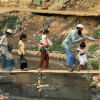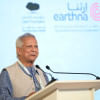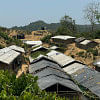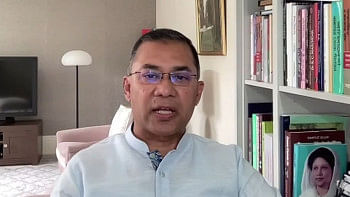‘UNSC can’t avoid responsibility over Rohingya crisis’

Bangladesh has said the international community, particularly the United Nations Security Council, cannot avoid its responsibility for a sustainable solution of the Rohingya crisis through voluntary, safe and dignified return of the Rohingyas to their place of origin and bringing the perpetrators to justice.
The Permanent Representative (PR) of Bangladesh to the UN Ambassador Masud Bin Momen came up with the comment recently at the Open Debate of the Security Council on 'Sexual Violence in Conflict' at the UN Headquarters, a press release of Permanent Mission of Bangladesh to the UN said today.
Mentioning that the culture of impunity as experienced by the world in the case of Rohingya crisis-related sexual violence in Myanmar, the UN ambassador said, "Without bringing an end to it, justice cannot be full. In such cases, ensuring accountability and justice is a must to create confidence and incentivize repatriation which we do not see happening".
In this context, Ambassador Masud asked the Council: "Would you expect these Rohingyas particularly the women and girls who have been subject to unspeakable sexual violence to be willing to return without any guarantee that the same fate would not befall upon them?"
He recalled the horrific experience during Bangladesh's Liberation War in 1971 when the women of Bangladesh had gone through widespread and systematic sexual violence and abuse as a tactic of war.
In this connection he said, "That has come back with the Rohingya humanitarian crisis. According to 'Save the Children', in 2018 alone, an estimated 4,000 Rohingya babies were born in the camps, many of whom are unwanted even by their mothers, as we can all imagine, why? Their recognition, compensation, and ensuring for them a better future in their country of origin is something international community should take a hard look at".
Highlighting Prime Minister Sheikh Hasina's 'zero tolerance' policy on sexual exploitation and abuse, he said, "In Bangladesh, as a top troops/police contributing country, we have ensured raising awareness raising and pre-deployment training for all our peacekeepers. We have also implemented guidelines by our Supreme Court by establishing women-only committees in workplaces to hear complaints against discrimination and sexual violence against women and girls".
"Our authorities are going ahead with the National Plan of Action on women, peace and security with the help of UN Women". Ambassador Masud also enumerated Bangladesh's initiatives to prevent sexual violence such as, strengthening national laws and investigation mechanisms, providing protection to victims, ensuring victims' rights for sexual and reproductive healthcare and reparation and capacity building at local and national levels".
The UN Secretary-General António Guterres, Special Representative of the Secretary-General on Sexual Violence in Conflict Pramila Patten, Nobel Peace Prize Laureates in 2018 Dr Denis Mukwege Mukengere and Nadia Murad, and Barrister Amal Clooney spoke at this high-level open debate.
The open debate focused on the importance of accountability, and also addressed survivor-centred approaches to addressing sexual violence in conflict settings.

 For all latest news, follow The Daily Star's Google News channel.
For all latest news, follow The Daily Star's Google News channel. 








Comments